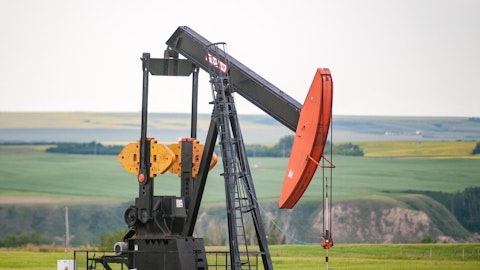Alejandro Lew: Okay. In terms of the LNG project, we are still on an early stage of analysis of the project. Of course, we have signed the MOU with Petronas. We are working very closely together on the technical and economic analysis to get to a final investment decision, as was mentioned at some point next year with the idea of having an FID before the end of next year. We have not fully tackled the financing of the project yet. Of course, we still have some time ahead of us. But we definitely are not aiming at — or clearly, we would love to, but being realistic, we are not aiming at a typical 80% to 90% project financing for such a project, but rather a much more conservative level, significantly lower than that. So both parties understand that to get to FID, we need to clearly put together a clear financing plan that we will of course, discuss internally first and negotiate or work with financial institutions towards that.
And definitely, we would expect probably some multilateral support, even though many multilaterals are closed these days for financing hydrocarbons, but we still believe that there are some others that are capable of looking at financing natural gas, like the Corporacion Andina de Fomento has recently announced potential financing of infrastructure — pipeline infrastructure in Argentina, understanding that natural gas is a transition fuel. So we believe that the same way that CAF has done, we expect to be able to work with some multilateral agencies and ECAs to also put together a reasonable financing plan for that. So all in all, of course, it’s going to require a further equity contribution from the partners, and that’s why — as mentioned in the presentation, we believe that our plan for coming years should enable us to provide our fair share of that investment with the amount of resources that we are likely to release through the monetization — primarily the monetization of our crude oil opportunities.
Unidentified Company Representative: Third question is, which is — what is the minimum level of CapEx necessary to maintain your operations with the existing levels of oil and gas output?
Alejandro Lew: Okay. We tackled that question in the past, of course, the larger proportion of shale in our mix makes capital intensity more relevant as well as cost pressures or cost increases also have increased our overall minimum CapEx required. So there is no specific number that I can provide, but I would say that probably is in the range of $3 billion to $3.5 billion per year at current prices at current cost levels to stabilize our hydrocarbon production level.
Unidentified Company Representative: And last question from Frank McGann from BofA is how should we think of the decline in oil reserves? Given the oil growth expected, do you see significant upside reserves?
Alejandro Lew: If I understood the question correctly, in terms of our forward-looking for the evolution of reserves, clearly, there is a particularity when considering P1 reserves for shale resources, because it’s not — it’s a different way of assessing and pricing those than comparing to conventional resources. So you need to be developing your resources to be able to fully transform them into P1. So clearly, as we move into full development of VacaMuerta and mostly the core hub and also the north and south blocks, we would expect to continue generating healthy recovery ratios in terms of how we manage to maintain our reserves, P1 reserves in a healthy level compared to our production levels, which is what we have managed to achieve last year and this year as well, where even though we clearly this year, have grown our production by 7%, both in BOEs and also in oil, in particular.
And still, we managed to grow our P1 reserves by 4% with a reserve replacement ratio of around 124%.
Unidentified Company Representative: Ms. Carvalho from UBS has 3 questions. With elections coming this year, what are the challenges, risks in case the country continue facing tough economy environment, high inflation and devaluation?
Alejandro Lew: Sorry, can you repeat that question?





